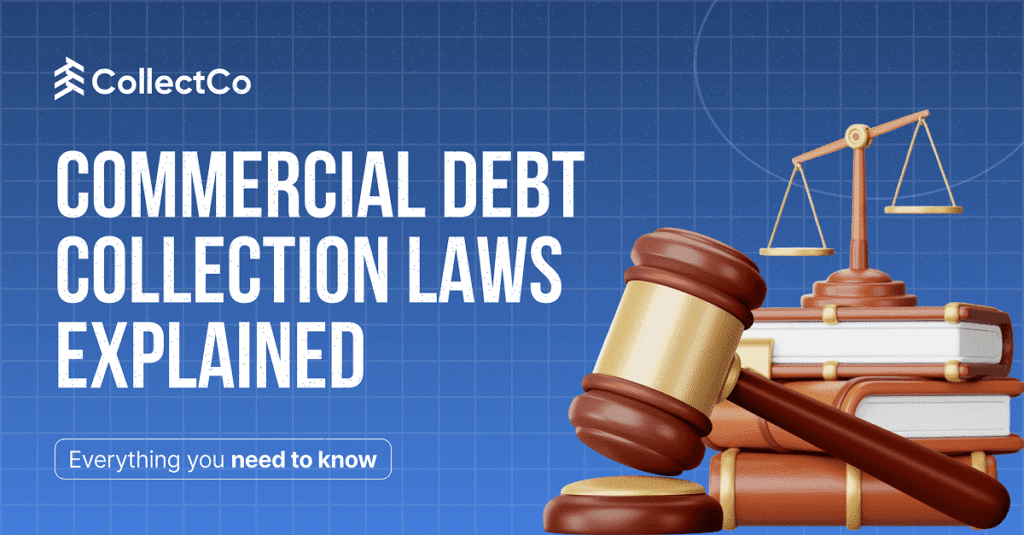Managing business finances while clients are not clearing up unpaid invoices can severely harm cash flow, especially in commercial debt collection. Without proper recovery solutions, your business can be on the verge of financial extinction if you are not careful.

Source: Freepik
Businesses worldwide are facing the lasting effects of an unstable economy and higher inflation rates. With companies failing to meet their benchmarks, many have resorted to implementing commercial debt collection strategies in their workflow to help manage their cashflows and mitigate the risk of bad debt.
What are Strategies for Successful Commercial Debt Collection?
Developing strategies for successful commercial debt collection requires businesses to overview their internal and external operations, such as whether clients are not keeping up with their unpaid invoices due to a flaw in their recovery strategy or unforeseen external circumstances.
To counter such spiking debt rates, healthcare institutions have developed financial assistance programs such as “hospital charity programs” that compensate a portion of the amount owned by the patients as part of their effective medical billing solutions.
According to reports from PAYFOR, the US has the highest commercial debt of 24.68% compared to other top entries in the list. With such high rates of business debt, it has become crucial for businesses to start integrating strategies to enhance their commercial debt collection without risk. Here are some ways your business can also boost your commercial collections.
Create Clear Credit Policies
Credit policies are a great way to establish clear rules and conditions between companies and customers. They can also help businesses regulate their commercial debt collection more optimally since they serve as a written agreement between entities in case a claim dispute occurs in the future.
These policies are based on the customers’ credit limits and have detailed payment schedules. Moreover, credit policies can also help businesses assess the creditworthiness of clients to verify whether they’ll be able to keep up with their payments, as these assessments can help companies streamline their commercial debt collection.
In addition, credit policies can help communicate the consequences of late payments firsthand so that users can better understand the potential fines, deductions, or other recovery efforts that can be taken in case of unpaid invoices in commercial debt collection. Such policies can allow businesses to maximize their recovery potential with credit collection services.
How Can Financial Assessment Help You Avoid Losses
Like creditworthiness, as previously discussed, businesses should use financial assessments to get a clearer picture of the client’s previous history. Such assessments can include debt history, payment history, credit reports, and more to properly analyze the client’s financial health and determine whether they are suited for such a collaboration.
Although such assessments are done before any b2b debt collection takes place, they can still be a great strategy to avoid bad debt in commercial debt collection.

Source: Freepik
Why Documentation and Debt Records Are Crucial for Your Business
To ensure a transparent commercial debt collection experience, businesses should keep records of proper documentation and financial transactions between entities. Such efforts are crucial in today’s age, as reports from Whale suggest that around 97% of organizations have minimum digital processes for documentation, which makes them more prone to challenges in case a claim dispute occurs.
Businesses must keep a record of documentation as they can help maintain accurate records, track communication, implement strategies for commercial debt collection, and support legal action in the future.
Implement Automated Software in Commercial Debt Collection
Automation and AI have truly revolutionized how businesses can carry out their commercial debt collection through tools and techniques that can boost your recoveries without expending additional resources.
To better understand how automation can increase commercial collections, it is vital to overview the benefits that automation and AI bring to companies. These include streamlining manual tasks, automated payment processing, and even fraud detection by detecting any anomalies in the system. Furthermore, AI and automation allow businesses to consistently stay in touch with their customers in commercial debt collection through automated reminders that reduce the probability of unpaid invoices and mitigate the resources spent on such follow-ups which further proves that how AI can exponentially boost your collections.
Speaking of resources, statistics from Quixy state that around 31% of business leaders believe that automation can help reduce labor costs. Such resource allocation improves businesses’ financial health, allowing them to better provide proactive commercial debt collection solutions.

Source: Freepik
How To Use Negotiations and Settlements in Commercial Debt Collection
A significant part of commercial debt collection depends on the negotiations and settlements between the entities involved. Such negotiations can include flexible payment plans, extending the grace periods, or removing penalties due to overdue invoices in commercial debt collection.
Things to Look for When Negotiating Settlements in Commercial Debt Collection
Before finalizing any negotiation, terms or settlement offers, it is crucial that businesses assess their clients’ financial health and clearly communicate the objectives of the process.
Moreover, keeping a record of the communications made between parties in commercial debt collection can enable businesses to verify whether any terms are being violated or misinterpreted by either party. The agreements should be fair while protecting the interests of creditors and their clients to avoid future claims. Such efforts can help establish a transparent framework for settling negotiations without risks in business-to-business debt collection.
Use These Key Metrics for Your B2B Debt Collection
Tracking your recovery efforts and their outcomes is essential in commercial debt collection. It allows for thorough assessment in case the workflow needs to be optimized or changed completely. Like the metrics businesses use to keep track of their sales, b2b debt collection involves metrics that can provide valuable insights to further enhance your business debt collection.
- Day Sales Outstanding (DSO) – the average number of days the business takes to collect the unpaid invoices once the sale is made.
- Debt Collection Rate – the rate at which the total outstanding payments were collected in a specified time frame.
- Aging of Accounts Receivables – the duration for which the payments have been unpaid in accounts receivable
- Promise-to-Pay (PTP) Ratio – the ratio of payment commitments made by the clients to the actual number of payments fulfilled within a time in commercial debt collection.
- Cost Per Collection – the cost taken by the business to collect a certain amount of debt.
Collaborate with a Commercial Debt Collection Agency
An expert commercial debt collection agency can significantly boost your collection rates and improve your business cashflows since they have more industry-related experience and effective recovery strategies. Moreover, reports from IBIS World suggest that the collections industry revenue is estimated to reach $20.9 Billion in 2024, with an upward projection estimated for the next five years. Here are some ways a b2b debt collection agency can help your business achieve better collections:
- Trained Professionals – A commercial collection agency brings in a team of experienced personnel who can provide proactive debt recovery solutions for your business.
- Global Reach – A competent b2b debt collection agency such as CollectCo offers its customers a recovery solution across the globe thanks to its international reach.
- Custom Tailored Solutions – A commercial debt collection agency incentivizes its customers to clear their debts early by offering flexible payment plans or negotiated amounts custom-tailored to the needs of your business.
- Litigation Support –When required, a commercial debt collection agency can provide services for legal actions, court proceedings, and more if things escalate during the recovery process.
- Credit Reporting –Reporting to credit bureaus is also a great way to tackle unpaid invoices in commercial debt collection due to non-compliant customers.
With thousands of satisfied businesses and companies, CollectCo continues to facilitate its users worldwide through automation collection practices that maximize your recovery potential without risks. Furthermore, CollectCo also provides custom-tailored solutions and early intervention efforts that can help your business get paid faster in commercial debt collection. Contact CollectCo today to start your b2b debt collection journey!






